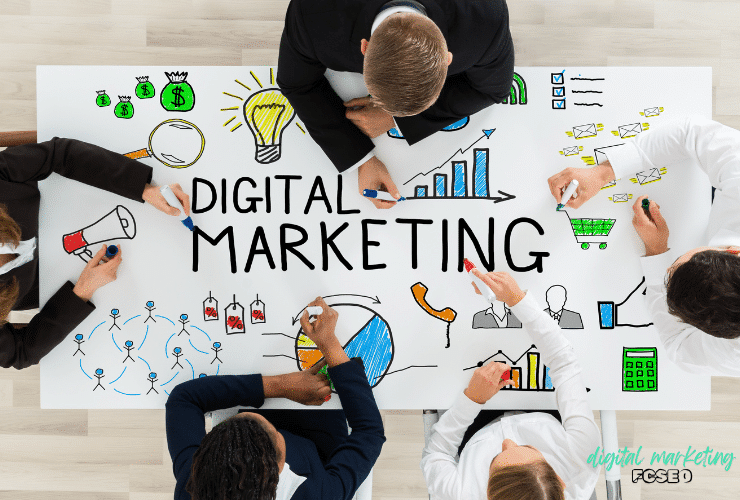Content marketing is a vital aspect of any digital marketing strategy. By creating valuable and relevant content, businesses can attract and engage their target audience, build brand awareness, establish authority, increase website traffic, generate leads and sales, and create a loyal following. In this article, we will explore the key elements of a successful content marketing strategy and provide tips for content creation, promotion, management, optimization, and distribution.
Key Takeaways:
- Content marketing is a powerful marketing strategy that focuses on creating valuable and relevant content to attract and engage a clearly defined audience.
- A well-defined content marketing strategy can help businesses achieve their marketing objectives, increase brand awareness, and drive business growth.
- Key steps to develop an effective content marketing strategy include defining goals, identifying target audience, conducting a content audit, setting a budget, creating a content calendar, and measuring results.
- Types of content that perform well across different audiences include blog posts, infographics, videos, ebooks, whitepapers, social media posts, webinars, and podcasts.
- Measuring the success of content marketing involves tracking metrics such as website traffic, engagement, conversions, ROI, and brand awareness.
What is Content Marketing?
Content marketing is a strategic marketing approach that involves creating and distributing valuable, relevant, and consistent content to attract and retain a defined audience. The goal of content marketing is to provide information or entertainment to potential customers, building trust and authority, and ultimately leading to profitable customer action.
Content can take various forms such as:
- Blog posts
- Videos
- Social media updates
- Ebooks
- Infographics
- Podcasts
By consistently creating and sharing valuable content, businesses can attract an audience, establish themselves as a trusted resource, and ultimately drive profitable customer actions such as:
- Purchase
- Subscription
- Lead generation
Content marketing is not about directly promoting products or services, but rather about providing value and building relationships with potential customers. Through content marketing, businesses can attract and engage their target audience, create brand awareness, and nurture prospects throughout the buyer’s journey.
Content marketing is a strategic marketing approach that involves creating and distributing valuable, relevant, and consistent content to attract and retain a defined audience.
Providing valuable and relevant content allows businesses to showcase their expertise and build trust with their audience. Content marketing also encourages audience engagement and sharing, which can lead to increased brand visibility and reach.

How can Content Marketing Help Your Business?
Content marketing is an essential strategy that can benefit businesses in various ways, helping them attract and engage customers, build brand awareness, establish authority and thought leadership, increase website traffic, generate leads and sales, and create a loyal audience. By consistently creating and sharing high-quality and relevant content, you can provide value to your target audience and build strong relationships with them, ultimately driving business growth and success.
One of the primary advantages of content marketing is its ability to attract customers. By producing valuable and informative content that addresses their pain points and interests, you can capture the attention of potential customers, making them more likely to engage with your brand. Additionally, content marketing helps you engage customers by providing them with the information they seek, fostering trust and loyalty.
Another crucial benefit of content marketing is its role in building brand awareness. When you create and distribute content that showcases your expertise and solves your audience’s problems, you establish your brand as a credible and trustworthy source. This increased brand visibility not only attracts more potential customers but also reinforces your authority in the industry.
Content marketing also plays a vital role in increasing website traffic. By optimizing your content for search engines and incorporating relevant keywords and phrases, you can improve your search engine rankings and drive more organic traffic to your website. This increased traffic provides greater opportunities for lead generation and sales conversion.
Speaking of lead generation, content marketing is highly effective in generating leads. By offering valuable content that requires users to provide their contact information, such as downloading a free ebook or signing up for a newsletter, you can capture leads and nurture them into potential customers.
Furthermore, content marketing contributes to increased sales by providing your audience with the information they need to make informed purchasing decisions. By creating content that showcases your products or services, highlights their benefits, and addresses common customer concerns, you can influence potential customers and drive conversions.
Finally, content marketing helps businesses build a loyal audience. By consistently delivering valuable and relevant content, you can establish a strong connection with your audience, foster engagement and loyalty, and turn them into repeat customers and advocates for your brand.
In summary, content marketing is a powerful strategy that can help your business attract customers, engage them, build brand awareness, establish authority, increase website traffic, generate leads, increase sales, and build a loyal audience. By implementing a comprehensive content marketing plan and consistently delivering high-quality content, you can unlock growth and achieve your business objectives.

What Types of Content are Best for Your Target Audience?
The best types of content for your target audience depend on their demographics, interests, behavior, and preferences. However, some types of content that generally perform well across different audiences include blog posts, infographics, videos, ebooks, whitepapers, social media posts, webinars, and podcasts. It is important to understand your target audience’s preferences and behavior to determine which type of content will resonate with them the most.
| Type of Content | Description |
|---|---|
| Blog Posts | Informative and engaging articles that provide value and insights to your audience. |
| Infographics | Visual representations of data or information that are easy to understand and share. |
| Videos | Engaging and dynamic content that appeals to visual and auditory learners. |
| Ebooks | In-depth guides or resources that offer comprehensive information on a specific topic. |
| Whitepapers | Research-based reports or case studies that provide authoritative insights. |
| Social Media Posts | Short and shareable content that encourages interaction and engagement on social platforms. |
| Webinars | Live or recorded presentations that educate and engage your audience. |
| Podcasts | Audio content that allows your audience to listen and learn on-the-go. |
Each type of content has its own strengths and advantages. By diversifying your content creation and utilizing various formats, you can cater to different learning preferences and engage a wider audience. Experiment with different content types to determine which resonates best with your target audience and drives the desired results.
How to Develop a Content Marketing Strategy?
In today’s competitive digital landscape, developing a strong content marketing strategy is crucial for businesses looking to stand out and effectively engage their target audience. By following a strategic approach, you can create valuable content that drives results and helps you achieve your marketing goals. Here are the key steps to developing a successful content marketing strategy:
- Define your goals: Start by clearly defining your content marketing goals. Are you looking to increase brand awareness, generate leads, drive website traffic, or boost sales? Clearly outlining your objectives will guide your content creation and distribution efforts.
- Identify your target audience: Understanding your target audience is essential for creating content that resonates with them. Conduct thorough market research to identify your audience’s demographics, interests, pain points, and preferences. This information will help you tailor your content to meet their needs and interests.
- Conduct a content audit: Before developing new content, conduct a content audit to assess the effectiveness of your existing content. Identify the gaps and opportunities in your content strategy and make improvements accordingly. Analyze metrics such as website traffic, engagement, and conversions to gauge the performance of your content.
- Set a budget: Allocate a budget for your content marketing efforts. Determine how much you are willing to invest in content creation, distribution, and promotion. Having a budget in place will help you prioritize your resources and make informed decisions.
- Create a content calendar: A content calendar is essential for organizing your content creation and distribution efforts. Plan out the topics, formats, and publishing schedule for your content. This will ensure consistency and help you stay organized.
- Create high-quality content: Focus on creating content that provides value to your audience. Craft compelling and informative blog posts, videos, infographics, ebooks, and other formats that address their pain points and offer solutions. Invest in high-quality content that showcases your expertise and builds trust with your audience.
- Distribute and promote your content: Developing great content is just the first step. To reach your target audience, you need to effectively distribute and promote your content. Utilize social media platforms, email marketing, paid advertising, content syndication, influencer marketing, SEO, and other distribution channels to maximize your content’s reach.
- Measure the results: Regularly track and measure the performance of your content marketing efforts. Monitor key metrics such as website traffic, engagement, conversions, and ROI to evaluate your strategy’s effectiveness. Use this data to make data-driven decisions, optimize your content, and improve your strategy over time.
By following these steps, you can develop a comprehensive content marketing strategy that aligns with your business objectives, engages your target audience, and drives meaningful results.

How to Measure the Success of Your Content Marketing?
Measuring the success of your content marketing efforts is crucial for determining the return on investment and making data-driven decisions. By tracking and analyzing key metrics, you can gain valuable insights into the effectiveness of your content strategy and optimize your approach for better results.
Here are some important metrics to consider when measuring the success of your content marketing:
- Website Traffic: Monitor the flow of visitors to your website to gauge the overall reach and visibility of your content. A steady increase in website traffic indicates that your content is attracting attention and driving interest.
- Engagement: Keep an eye on metrics such as likes, comments, and shares to evaluate how well your audience is interacting with your content. Higher engagement levels indicate that your content is resonating with your target audience and sparking conversations.
- Time on Page: Analyze the average time visitors spend on your content pages to determine if your content is holding their attention. Longer time on page suggests that your content is compelling and valuable, keeping readers engaged.
- Conversions: Measure the number of conversions, such as sign-ups or purchases, directly attributed to your content. This metric helps assess the impact of your content in driving desired actions and conversions.
- ROI (Return on Investment): Calculate the return on investment to determine the cost-effectiveness of your content marketing efforts. Compare the financial impact of your content against the resources invested, demonstrating the value it brings to your business.
- Brand Awareness: Assess the growth of brand awareness by tracking indicators like social media mentions, search volume, or brand searches. Increased brand awareness indicates that your content is successfully reaching and resonating with your target audience.
To effectively measure the success of your content marketing, it’s essential to set specific goals and key performance indicators (KPIs) aligned with your business objectives. Regularly monitor these metrics, analyze the data, and make informed decisions to optimize your content strategy for better engagement, conversions, and overall ROI.
| Metric | Description |
|---|---|
| Website Traffic | Number of visitors to your website |
| Engagement | Likes, comments, shares, and other interactions with your content |
| Time on Page | Average duration visitors spend on your content pages |
| Conversions | Actions taken on your website as a result of your content (sign-ups, purchases, etc.) |
| ROI (Return on Investment) | Financial impact of your content in relation to the resources invested |
| Brand Awareness | Growth of brand recognition and visibility |
Best Practices for Creating Effective Content
When it comes to content marketing, creating effective content is essential for engaging your target audience and achieving your marketing objectives. To ensure your content resonates with your audience and achieves the desired results, consider incorporating these best practices:
- Define Your Target Audience: Before creating content, it’s crucial to have a clear understanding of your target audience. Identify their demographics, interests, needs, and pain points to tailor your content specifically to them.
- Focus on Quality Content: Quality content is the foundation of any successful content marketing strategy. Ensure your content provides value, is well-researched, informative, and engages your audience. This will help establish your brand as a thought leader in your industry.
- Use a Variety of Content Formats: Utilize different content formats to appeal to different preferences and learning styles. Consider creating blog posts, infographics, videos, ebooks, and podcasts to cater to a wider audience and enhance engagement.
- Incorporate SEO Techniques: Implement SEO strategies to optimize your content for search engines. Research relevant keywords, include them naturally in your content, optimize page titles, meta descriptions, and headings to improve your content’s visibility and organic search rankings.
- Create a Content Calendar: Develop a content calendar to stay organized and consistent in your content creation efforts. This will help you plan and schedule content in advance, ensuring a regular flow of high-quality content to engage your audience.
- Promote Your Content: Content promotion is as important as content creation. Use various channels such as social media, email marketing, and paid advertising to distribute and promote your content. Engage with influencers, collaborate on guest posts, and share your content through relevant communities to amplify its reach.
- Monitor Results: Continuously monitor the performance of your content. Analyze metrics such as website traffic, social media engagement, conversions, and ROI to evaluate the effectiveness of your content marketing efforts. Use these insights to make data-driven decisions and optimize your future content.
By following these best practices in content creation, you can enhance your content marketing strategy and effectively engage your target audience, ultimately driving business growth and achieving your marketing goals.
How to Distribute Your Content to Reach Your Target Audience
Reaching your target audience is crucial for the success of your content marketing efforts. To ensure that your valuable content reaches the right people, you need to employ effective content distribution strategies. Here are some proven methods to distribute your content:
- Social Media Promotion: Leverage the power of social media platforms such as Facebook, Twitter, Instagram, and LinkedIn to share your content with your target audience. Engage with your followers, join relevant communities, and use relevant hashtags to increase visibility.
- Email Marketing: Build an email list of subscribers who are interested in your content. Send regular newsletters and updates to keep them informed and engaged. Personalize your emails for better engagement and utilize compelling subject lines to encourage open rates.
- Paid Advertising: Consider investing in paid advertising platforms like Google Ads, Facebook Ads, or LinkedIn Ads to promote your content. Target specific demographics, interests, and behaviors to reach the right audience for your content.
- Content Syndication: Syndicate your content on third-party platforms, such as industry publications or content discovery platforms, to increase your reach and drive traffic back to your website.
- Influencer Marketing: Collaborate with influencers in your industry who have a large and engaged following. Partnering with influencers can help you tap into their audience and gain credibility and exposure.
- Search Engine Optimization (SEO): Optimize your content for search engines using relevant keywords, meta tags, and backlinks. By improving your content’s visibility in search engine results, you can attract organic traffic from users actively searching for information related to your content.
- Events and Webinars: Participate in industry events, conferences, and webinars to showcase your expertise and network with potential customers. Leverage these opportunities to distribute your content and establish your brand as a thought leader.
Remember, when choosing your content distribution channels, focus on the platforms that align with your target audience’s preferences and behavior. Additionally, monitor and analyze the performance of each distribution channel to refine your strategy and maximize your content’s reach and impact.
Conclusion
Content marketing is an effective strategy for businesses looking to unlock growth, engage their audience, increase brand awareness, generate leads, and drive sales conversions. By developing a comprehensive content marketing strategy, you can create valuable content that resonates with your target audience and achieves your marketing goals.
To ensure success, it’s important to continually analyze and optimize your content marketing efforts. This involves monitoring key metrics such as website traffic, audience engagement, and conversions. By understanding what resonates with your audience, you can make data-driven decisions to refine your content strategy and drive business growth.
Moreover, content distribution plays a crucial role in reaching your target audience. Leveraging channels such as social media, email marketing, paid advertising, content syndication, influencer marketing, SEO, and event participation can enhance content distribution and increase its impact.
In conclusion, content marketing is an effective and versatile strategy that can help businesses achieve their growth objectives. By consistently creating and distributing high-quality content, you can engage your audience, increase brand awareness, generate leads, and ultimately drive sales conversions. Embrace content marketing as a strategic tool and watch your business thrive.

FAQ
What is content marketing?
Content marketing is a strategic approach that focuses on creating valuable and relevant content to attract and retain a clearly defined audience.
How can content marketing help my business?
Content marketing can help businesses attract and engage customers, build brand awareness, establish authority, increase website traffic, generate leads and sales, and create a loyal audience.
What types of content are best for my target audience?
The best types of content for your target audience depend on their demographics, interests, behavior, and preferences. However, some types of content that generally perform well across different audiences include blog posts, infographics, videos, ebooks, whitepapers, social media posts, webinars, and podcasts.
How do I develop a content marketing strategy?
Developing a content marketing strategy involves defining goals, identifying the target audience, conducting a content audit, setting a budget, creating a content calendar, and measuring results.
How do I measure the success of my content marketing?
Measuring the success of content marketing efforts involves tracking metrics such as website traffic, engagement, conversions, ROI, and brand awareness.
What are the best practices for creating effective content?
To create effective content, it is important to define the target audience, focus on quality content, use a variety of content formats, incorporate SEO techniques, create a content calendar, promote content through various channels, and monitor the results.
How do I distribute my content to reach my target audience?
There are various ways to distribute content and reach the target audience, including social media promotion, email marketing, paid advertising, content syndication, influencer marketing, SEO, and participating in events and webinars.





